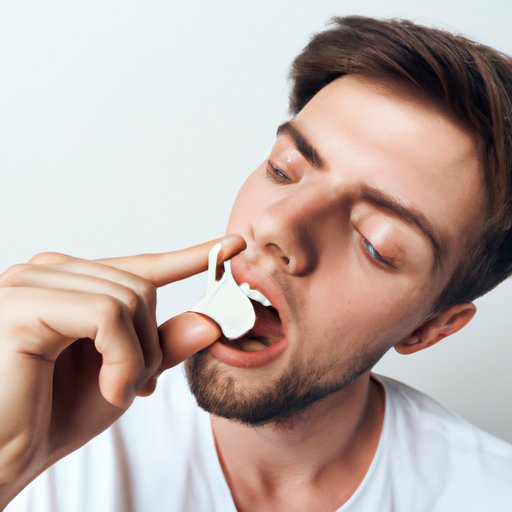
Introduction
Wisdom teeth removal is a common dental procedure that can cause discomfort and pain post-surgery. Many patients wonder if smoking is safe after the procedure and how it can impact their healing process. This article aims to explore the risks and complications of smoking post-surgery, alternative methods for relaxation, how long patients should wait before smoking, and the importance of recovery.
Smoking after Wisdom Teeth Removal: Risks, Complications, and Alternatives
Smoking after wisdom teeth removal can increase the risk of complications and prolong the healing process. Cigarette smoke contains harmful chemicals that can hinder the body’s natural ability to heal. Aside from delaying the healing process, smoking can also lead to infections, dry socket, and other complications.
For patients who are unwilling to give up smoking after the procedure, there are alternatives that they can use instead. Nicotine patches, gum, lozenges, and other products may be useful in managing cravings and easing anxiety.
The Do’s and Don’ts of Smoking After Wisdom Teeth Removal
Patients who choose to smoke post-surgery should take extra precautions to avoid aggravating the surgical site. Some tips to follow include avoiding smoking immediately after the surgery, waiting until the wound has fully stopped bleeding, and avoiding smoking for long periods of time.
On the other hand, things to avoid include smoking and inhaling deeply, smoking for long periods of time, and smoking with the surgical site exposed. These can all lead to infection, complications, and prolong the healing process.
The Science Behind Why You Shouldn’t Smoke After Wisdom Teeth Extraction
Smoking can negatively impact the healing process in various ways. It can reduce blood flow, lower oxygen levels, and increase the risk of infection. Additionally, the chemicals in cigarette smoke can damage soft tissues, dry out the mouth, and delay the healing process. These factors can lead to complications such as infection, dry socket, and prolonged healing times.
Alternative Methods for Relaxation Post-Wisdom Teeth Removal
For patients who are looking for alternative ways to manage pain and anxiety post-surgery, there are many safe methods they can use. Pain medication, ice packs, and relaxation techniques such as deep breathing or mindfulness can all help reduce discomfort and stress without the negative side effects of smoking.
How Long Do You Need to Wait to Smoke After Wisdom Teeth Removal?
Patients should wait at least 72 hours before smoking cigarettes or consuming other smoking products. During this period, the wound should have formed a clot and started to heal. Smoking too soon can dislodge this clot and expose the surgical site to air, bacteria, and other harmful substances.
It’s important to note that waiting 72 hours may not be sufficient for some patients, especially those who experience complications or have other health issues. Patients should always consult their dentist or oral surgeon for personalized advice on when they can resume smoking.
The Relationship Between Smoking and Dry Socket After Wisdom Teeth Removal
Dry socket is a painful condition that can occur after wisdom teeth extraction. It happens when the blood clot that forms after the surgery becomes dislodged or dissolves too soon. Smoking is a significant risk factor for developing dry socket, as the chemicals in cigarette smoke can damage the clot and delay healing.
The Ultimate Guide to Recovery After Wisdom Teeth Removal
Recovering from wisdom teeth removal takes time and patience. Patients need to follow their oral surgeon’s instructions carefully, including avoiding smoking, eating soft foods, and taking pain medication as prescribed. Additionally, patients should avoid using straws, spitting, or rinsing the mouth forcefully, as this can dislodge the clot and cause complications.
Conclusion
Smoking after wisdom teeth removal can have severe consequences for patients’ health and recovery. Alternative methods, such as nicotine patches or gum, can help manage cravings and anxiety without delaying healing. Patients should consult their dentist or oral surgeon for personalized advice on how to have the best recovery possible.
Overall, recovery after wisdom teeth removal requires patience and careful attention to post-operative instructions. Avoiding smoking and other risk factors is essential for preventing complications and ensuring a smooth recovery process.




